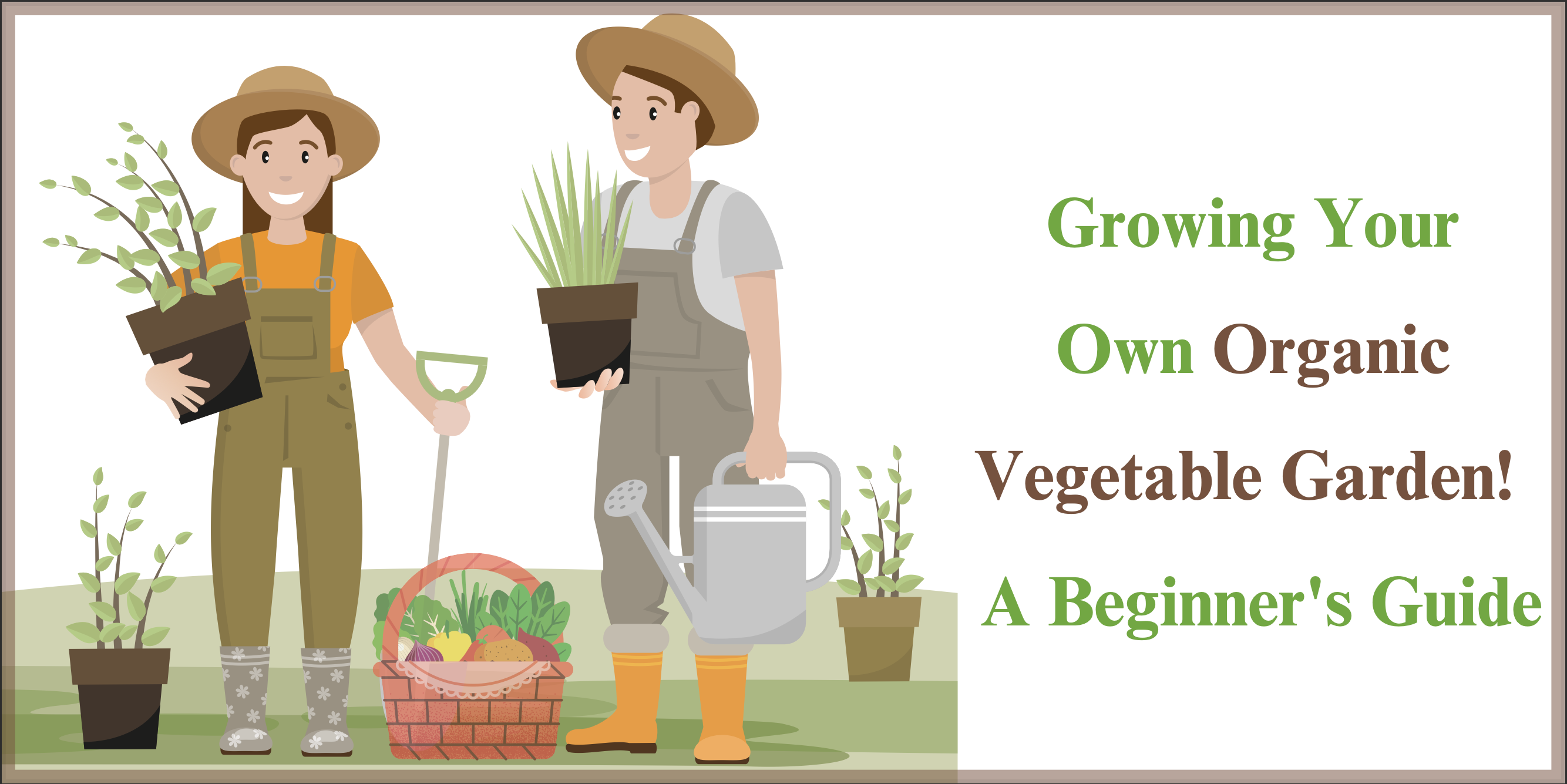
Growing Your Own Organic Vegetable Garden – A Beginner’s Guide
Organic vegetable gardening is a rewarding and enjoyable method to grow your own vegetables at home. It’s an excellent opportunity to get some fresh air, exercise, and cultivate some good, nutritious food. However, before you begin, you must first learn the foundations of organic vegetable planting.
Organic vegetable gardening is a style of gardening in which vegetables are grown without the use of synthetic pesticides, fertilizers, or other chemicals. Organic gardeners, on the other hand, focus on natural methods such as composting and companion planting to increase soil health, plants, and veggies. Organic vegetable farming is not only good for the environment, but it can also yield some of the most delicious crops!
Benefits of Organic Gardening
Organic gardening has numerous advantages that make it an excellent choice for individuals who want to grow their own vegetables. For starters, organic vegetables are healthier and more nutritious than conventionally cultivated vegetables.
They generally have more vitamins, minerals, and other nutrients than conventionally grown ones. Furthermore, organic vegetables have no artificial additives, hormones, or other potentially harmful ingredients.
Furthermore, organic vegetable gardening can be more pleasurable than standard gardening. It uses natural methods to cultivate healthy soil and plants, which takes more time and effort than typical gardening. Those seeking a greater connection to their food, on the other hand, will find the reward of cultivating their own organic vegetables well worth the work.
Finally, organic farming is beneficial to the environment. You may help reduce pollution in the environment by not using synthetic pesticides, fertilizers, and other chemicals.
Choosing the Right Location and Soil
The first step is to select the ideal area and soil for your organic food garden. To get the most out of your garden, choose a location that receives at least 6 hours of direct sunlight each day. The soil must be nutrient-rich and well-drained. You may easily obtain organic soil from your local garden center, or you can prepare your own compost to provide your plants with the nutrition they require. Composting is an excellent approach to ensure that your plants grow healthy and strong!
Selecting the Right Seeds and Plants
Once you have a great spot and soil, it’s time to pick the perfect seeds and plants for your organic vegetable garden. As you choose plants, ensure to select varieties that fit your local climate and soil. You may also search for organic or heirloom varieties, which are not exposed to any chemicals or GMOs.
When purchasing seeds, find organic kinds that don’t contain any chemicals, hormones, or other ingredients. You can also look for non-GMO varieties, which don’t include any genetically modified organisms.
After you’ve selected the right seeds and plants, you can start getting your garden bed ready!
Preparing the Garden Bed
When planning your organic vegetable garden, you must first prepare your garden bed. It is critical to ensure that the soil is loose, has appropriate drainage, and is rich in vitamins and minerals. Add some compost or other organic materials to provide the soil with all of the nutrients it need.
You’ll also want to check the soil for weeds, pebbles, and other unwanted materials. A rake or hoe can assist you in breaking up the soil and removing any large rocks or debris. You can then begin planting your crops!
Planting and Caring for Your Vegetables
It’s time to get started on your vegetable garden! Refer to the seed packets for the exact planting requirements and depth for your particular varieties. Keep the seeds moist and watered for optimal growth. After the sprouts appear, make sure to water your veggies about once a week and add some compost or other organic matter to enrich the soil. Don’t forget to pull out pesky weeds that may be stealing nutrients from the plants.
Organic Gardening Tips
Here are some pointers to help you make the most of your vegetable garden.
To begin, utilize organic fertilizers, insecticides, and other items. These shuld be completely devoid of chemicals, hormones, and other harmful substances, so you’ll be helping both your health and the environment!
Second, water your vegetables on a daily basis. Most veggies require one inch of water each week, and if you live in a hotter or drier area, you should water more frequently.
Third, make sure you rotate your crops. Growing the same veggies in the same location year after year can lead to soil depletion and pest problems. Rotation helps to prevent nutrient loss while also keeping pests at bay.
Finally, remember to mulch your garden! This helps to keep the soil hydrated and minimizes weed growth.
Organic Gardening Resources
Organic vegetable gardening is an incredibly fulfilling and enjoyable activity, but it can sometimes be a bit daunting. Here are some resources to get you off to a strong start!
First of all, take a look at your local library or bookstore for some helpful books on organic gardening. There are plenty of great books available that will guide you in the right direction.
Secondly, join an online gardening forum! You’re sure to find some fantastic forums full of brilliant advice, helpful questions and interesting tips from other gardeners.
Thirdly, don’t forget to pop into your local garden center! The knowledgeable staff there will be able to provide you with the best possible advice for starting your organic vegetable garden.
Finally, don’t forget to have fun! Organic vegetable gardening is a really rewarding and enjoyable experience, so make sure to take the time to savor it.
Conclusion
Organic vegetable gardening may be a rewarding and joyful experience! It’s a great way to get outside, be active, and raise some delicious, nutritious food. With the right location, soil, seeds, and plants, you can create a thriving organic vegetable garden in no time. So, get out there, get your hands dirty, and start growing some delicious organic vegetables right away!